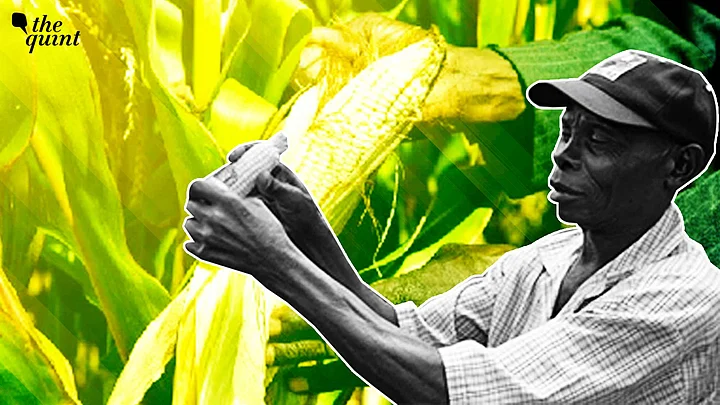In early October 2022, Kenya lifted a decade-long ban on importing Genetically Modified Organisms or GMOs as a source of food and feed. This follows Kenya's approval to GM cotton in response to the ongoing drought conditions.
Parts of Africa are experiencing unprecendented drought and nearly four million people in Kenya are facing hunger issues. Kenya’s move to adopt GMOs to improve food security comes on the recommendation of a task force which was set up to examine the safety and viability of using GMOs.
While this move may mitigate some of Kenya’s food concerns, the shift to GMOs in the middle of an ongoing disaster will take time and effort. With this backdrop, it is time for India to also revisit its de facto ban on GMOs and invest in this technology now.
However, in a recent breakthrough, the Genetic Engineering Appraisal Committee (GEAC), a unit of the Ministry of Environment, Forest and Climate Change has approved the GM mustard seeds developed by a top scientist and cleared its commercial use, thus, making it India's first-ever nod to GM food crop.
Study : GM Crops Pose Serious Health Concerns
On 21 November 2012, the Kenyan Ministry of Public Health (MOPH) ordered Public Health Officials to remove all genetically modified foods from the market and ban all GM imports following a 8 November decree by the then President Mwai Kibaki.
The ban was motivated by a French study led by GE Seralini that suggested an association between the use of herbicide on GM plants and risk of cancer in rats. The Kenyan Minister for Public Health, Beth Mugo, had presented concerns based on this study at a Cabinet meeting and recommended an immediate ban on GM imports and products. Following the decree, the Minister of Public Health had ordered a task force to be constituted to study the health effects of GM foods.
The original French study was later retracted by the publishing journal with a statement that while the study showed “no evidence of fraud or intentional misrepresentation of the data," the small number and type of animals used in the study meant that “no definitive conclusions can be reached.”
Subsequent studies have demonstrated that GM foods are generally safe for consumption and should be examined on a case-by-case basis, instead of placing a blanket ban on all technological products. Yet, Kenya did not revisit this ban till October 2022.
GM Crops Can Be Climate-Friendly
It has been in the face of persistent drought that Kenya has allowed the import and cultivation of GM crops to feed its starving population. Even now, there has been opposition to the move with groups contesting that the influx of GM seeds would threaten the organic farming that is currently happening.
While the adoption of GM crops will impact organic farming practices, it may also alleviate the food supply issue that Kenya faces. Particularly, with looming climate change, investment into drought-resistant plants may be a necessary decision that Kenya has to take.
India’s Trial of GM Crops Didn’t Bear Fruit
Similar to Kenya, India also placed a de-facto ban on GM crops, by announcing an indefinite moratorium on the indigenously developed Bt Brinjal in 2010.
The then Environment minister, Shri Jairam Ramesh had said that, “If you need long-term toxicity tests, then you must do it, no matter how long it takes…There is no hurry. There is no overriding urgency or food security argument for [release of] Bt Brinjal.”
Subsequent to this, India’s main regulator of GM organisms, the Genetic Engineering Appraisal Committee (GEAC) allowed field trials of Bt Brinjal in 2020, but these were also eventually scrapped.
It is reasonable to not allow the commercial sale of a product with an unknown safety profile. However, if studies are not conducted to establish the safety profile, GM food crops may never be allowed to enter India.
High Time for India To Adopt Food-Safe GMO Model
It is important that India shifts its position to allow more research and development on GM crops in India. Firstly, given climate change and the increasing food and nutritional demand from an economically improving Indian population, maintaining nutritional security with our current food production may become impossible.
Further, if India does not create its own GM crops, we may have to depend on imported seeds or crops to cater to our domestic needs. The creation of crops takes years and in an extreme situation, like the one that plagues Kenya currently, developing this expertise or making drastic changes to farming practices will be difficult. India needs to prepare for such an eventuality and hence, invest in developing expertise in GM technologies.
To achieve this, India needs to lay out a roadmap for approving GM crops and instill confidence that crops with proven safety profiles will be approved. This will incentivise research in the field and the generation of crops that are relevant to India’s problems.
We do not want to be left scrambling for accessing resources in an urgent situation—this would be a waste of our existing resources and expertise. Thus, India needs to learn from the Kenyan experience and use this time to gradually ease rules for GM crops while ensuring that the health of our citizens is safeguarded.
(Shambhavi Naik is the Head of Research at the Takshashila Institution. She has a PhD in biological sciences and works at the intersection of public policy and life sciences. This is an opinion piece and the views expressed above are the author’s own. The Quint neither endorses nor is responsible for them.)
